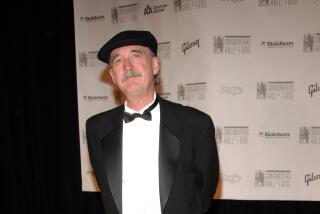Remembering Michael Masser, the songwriter who gave Whitney Houston his all

if any songwriter understood the ambitious reach of Whitney Houston, pop’s greatest ballad singer, it was Michael Masser.
In 1985, Michael Masser co-wrote and produced four songs for Whitney Houston’s smash-hit debut, three of which had the word “all” in their titles. Two years later, Masser penned another cut for Houston’s follow-up album.
The name of that one? “Didn’t We Almost Have It All.”
Clearly, if any songwriter understood the ambitious reach of pop’s greatest ballad singer, it was Masser, who died at age 74 last week at his home in Rancho Mirage. According to the Desert Sun, Masser suffered a stroke three years ago and never fully recovered.
In his early material for Houston — “All at Once,” “Saving All My Love for You” and, most famously, “Greatest Love of All,” still regarded as the late vocalist’s signature song — Masser composed lush melodies that brought a universal sweep to lyrics with appealingly specific points of view. “Saving All My Love for You,” for instance, depicts Houston as a woman in a dead-end affair with a married man.
“A few stolen moments is all that we share,” she sings, “You’ve got your family, and they need you there.” Yet the airy tune opens up the scope of the song, whose meaning almost certainly sneaked by some listeners on its journey to the top of the Billboard Hot 100.
You can think of Masser’s repeated language — not to mention his consistent use of a certain electric-piano tone — as part of a formula, proof of a devotion to efficiency left over from his days as a stockbroker in the 1960s. Compare the melody of “All at Once” to that of “Didn’t We Almost Have It All” and you’ll hear a guy who knew how to maximize the value of his labor.
But Masser also relied on these habits because they flattered Houston’s voice: The “ah” sound in all those “all’s” provided the necessary space to soar, while the delicate keyboard textures made her seem only more powerful by contrast. (Indeed, several of Masser’s songs for Houston were recorded first by other artists, though nowhere near as convincingly.)
Masser’s partnership with Houston followed earlier collaborations with stars including Diana Ross, for whom he and Gerry Goffin wrote the Oscar-nominated “Theme from Mahogany (Do You Know Where You’re Going To),” and Peabo Bryson and Roberta Flack (“Tonight, I Celebrate My Love”). He met Houston while working on Teddy Pendergrass’ 1984 album, “Love Language,” which featured a duet with her.
Yet Masser, a member of the Songwriters Hall of Fame, never duplicated the success he achieved with Houston, whose “legacy … will always be permanently indebted to Michael,” the singer’s longtime mentor, Clive Davis, said in a statement.
Perhaps that’s because he’d perfected his chosen form with her and could find no way to improve it.
Twitter: @mikaelwood
More to Read
The biggest entertainment stories
Get our big stories about Hollywood, film, television, music, arts, culture and more right in your inbox as soon as they publish.
You may occasionally receive promotional content from the Los Angeles Times.











